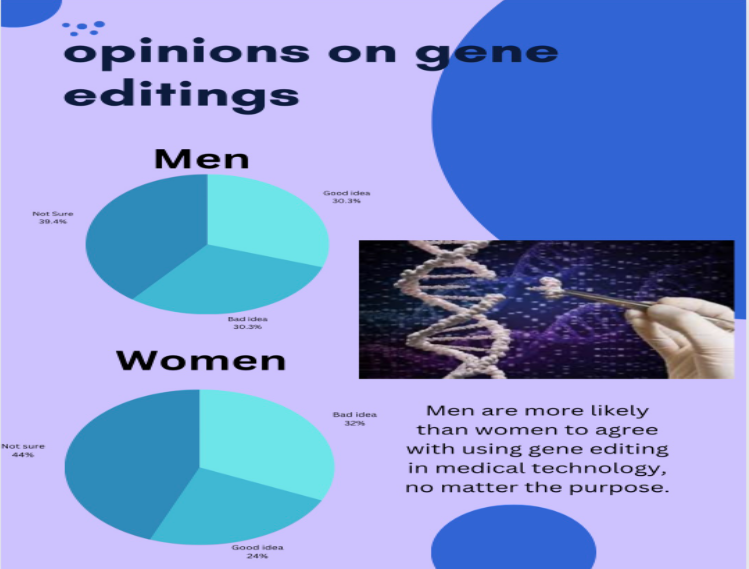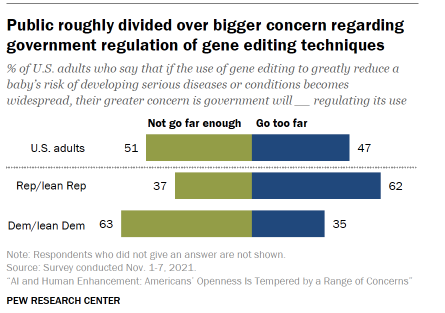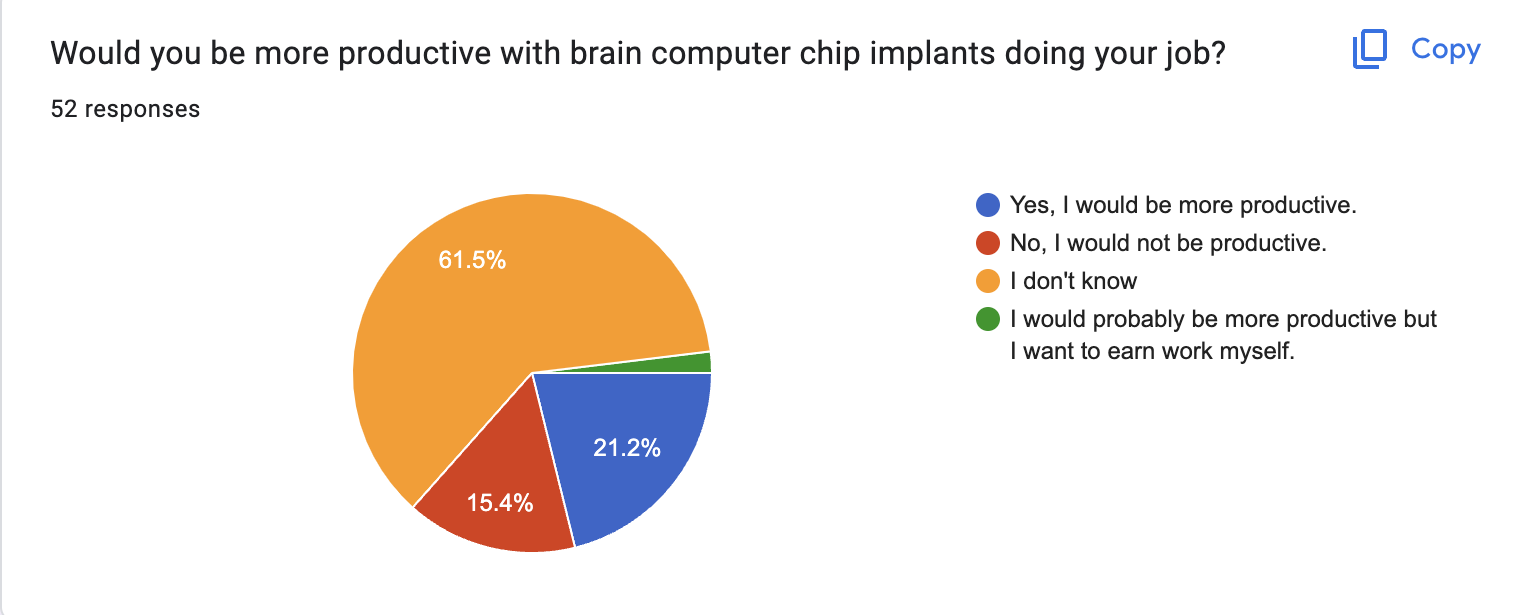Biotechnology
As technology is improving everyday, so are we. There are currently new human enhancement practices to improve people’s physical, mental, and reproductive capabilities. There are new techniques being tested to focus on addressing therapeutic needs and restoring a person’s abilities due to injury, disease or a health condition. As another way to improve human abilities, biotechnologists have been considering the possibilities of brain chip implants or robotic skeletons for adults while gene-editing enhancements could be done for their baby.
Gene-editing for babies would change the DNA of an embryo which would decrease the risks of a baby developing serious diseases and/or health conditions in their life.
Perspective on gene editing
People's views on gene editing can change based on many things like education, gender, and religion. People with more schooling are usually more open to gene editing. Men are often more okay with gene editing than women. Those with traditional religious beliefs may not like gene editing as much. Also, a person's values, culture, and situation can shape their thoughts on gene editing, making everyone's opinion different.
Benefits that are brought by Gene editing
39% of the U.S. adults believe gene editing would benefit people’s quality of life, although 40% of the U.S. adults believes nothing will be changed, but
Concerns about gene editing
In a survey on the opinions of the public regarding the government's current regulations on gene editing, adults felt that there weren't enough of them, whereas the government felt that there were. On the other hand, interns from the OFA organization felt similarly to US adults, with 30% of them believing that there needs to be improvement and 11% believing that there aren't nearly enough regulations.
55% of U.S. adults believe that widespread use of gene editing to reduce a baby's disease risk would widen the gap between higher- and lower-income Americans. 35% think it would have little effect, while 8% believe it would decrease the gap. Moreover, half of the OFA interns who responded to a survey said they agreed with this statement, while 25% said they were unsure. Since no one disagreed, this would be a major problem for our residents.
Brain Chips and Exoskeleton
A survey was conducted on US adults who were asked if they would or wouldn’t want brain chip implants, robotic exoskeletons, & gene editing. Most of the people do not want computer chip implants whereas an even split of people are okay with robotic exoskeletons & gene editing. We conducted another survey on OFA cohorts and majority of people do not want computer chip implants & nobody wanted any. This is pretty similar to the survey conducted on the US adults where majority of people do not want computer chip implants.
Are You Excited About The Future Potential Changes To Human Abilities?
Another survey was conducted on US where they were asked if they were very excited about the potential changes to human abilities. Majority of the people were very excited about these changes and an even split of people who were excited & concerned and people who were very concerned. Another survey was conducted on cohorts of OFA and the results show that majority of the people were actually equally excited & concerned. 2 people were very excited & 4 people were very concerned. These 2 graphs are quite different from each other one who has a majority in very excited & another has majority of equally excited & concerned.
Would You Be Pressured To Getting A Brain Chip?
US adults were asked if they felt pressured in getting a brain chip. About 3/5 of people feel pressure in getting this. At only around 2/5 don’t. We asked cohorts of OFA the same question. Majority of people wouldn’t feel pressured, and an even split of people would feel pressured and don’t know. Both surveys produced quite different responses, one had majority pressured and one had majority wouldn’t feel pressured.
Would You Be More Productive With Brain Computer Chip Implants?
A survey was conducted where US adults were asked if they would be more productive with brain chip plants. Majority (60%) said they would be more productive whereas (40%) said they wouldn’t. We then conducted the same survey on OFA cohorts and majority surprisingly said “I don’t know.” (60%) And only 21% said they would be more productive & 15% said they wouldn’t be more productive. We then compared both surveys and found a big difference. One was majority would be more productive and one was majority doesn’t know.
Could The Widespread of Exoskeletons Lead To Job Losses?
According to these two surveys, most individuals believe that exoskeletons won't significantly alter society or are unsure of how much change they will actually bring about. According to polls, people have mixed feelings and differing perspectives regarding exoskeletons; and in due course, one third of the people thinks exoskeleton would benefits the working environment, and one third of the people thinks it would brings job losses. Exoskeletons' future course is still unknown to us, but despite their advantages and disadvantages, they will unquestionably represent a significant improvement in human convenience and technical development.
Summary:
New inventions made possible by biotechnology include brain chips, robotic suits, and gene editing. Robotic suits can make laborious tasks easier, but there are worries about their affordability, safety, and impact on the workforce. Gene editing may be able to halt cancerous diseases and improve our quality of life, but it also raises ethical and moral concerns and concerns about the potential for additional health issues and whether it is just available to the wealthy. Although brain chips may increase our intelligence, they also bring up new ethical, privacy, and health issues. In conclusion, while biotechnology has many potential advantages, it also poses fresh problems that require thoughtful consideration and serious resolution.
Citations
Nadeem, Reem. “5. What Americans Think about Possibilities Ahead for Human Enhancement.” Pew Research Center: Internet, Science & Tech, 17 Mar. 2022, www.pewresearch.org/internet/2022/03/17/what-americans-think-about-possibilities-ahead-for-human-enhancement/.
“Human Enhancement and the Future of Work.” Royal Society, royalsociety.org/topics-policy/projects/human-enhancement/. Accessed 25 July 2023.
“CRISPR Development Enables Simultaneous Gene Editing.” Drug Target Review, 17 Mar. 2020, www.drugtargetreview.com/news/57461/crispr-development-enables-simultaneous-gene-editing/.






















